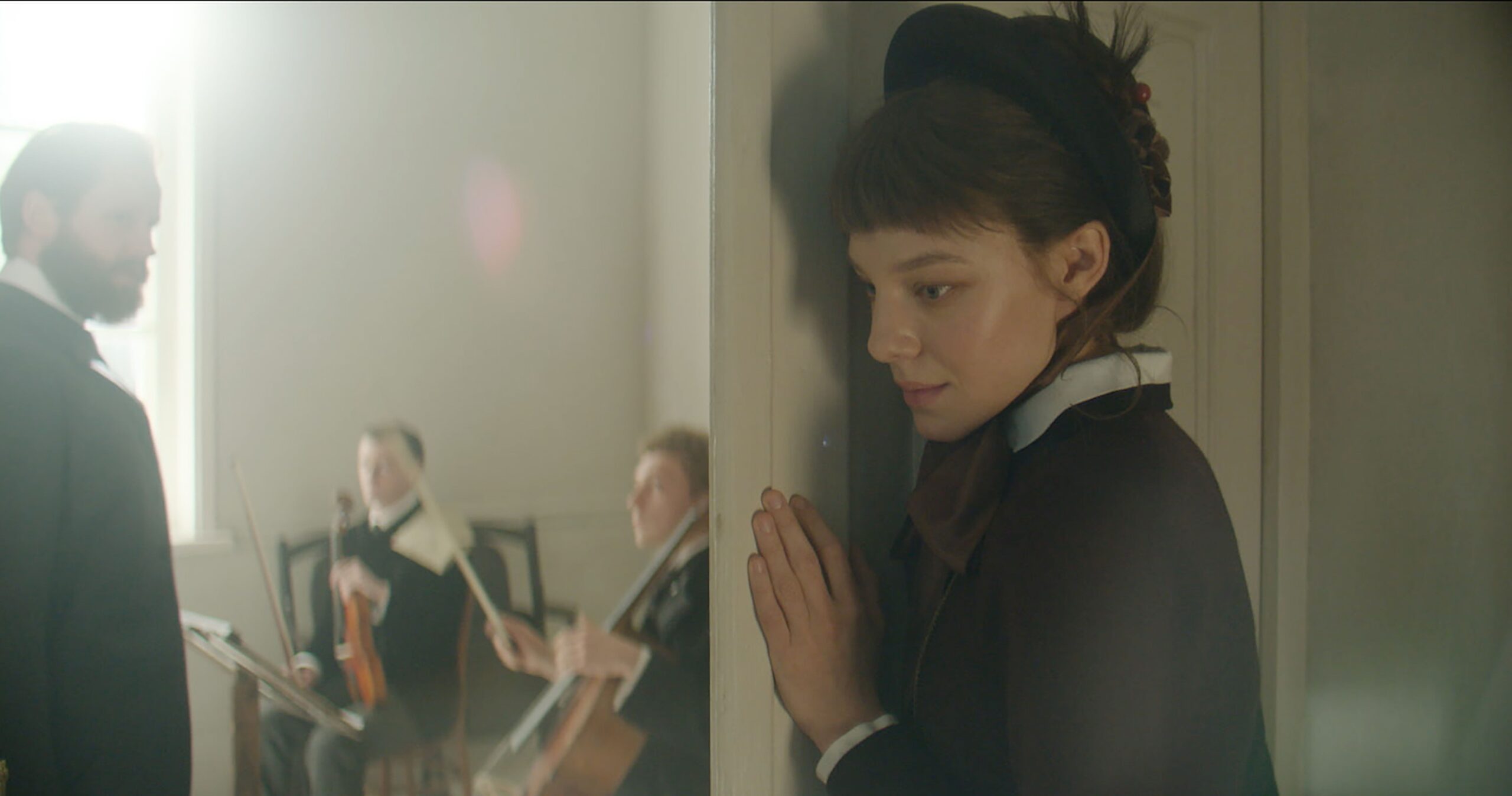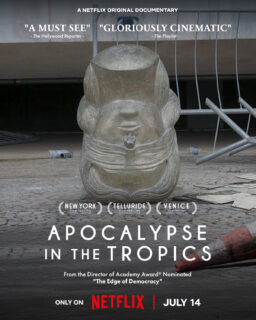The most noteworthy thing about the competition film “Tchaikovsky’s Wife,” strong as it is, might not be the movie at all. It’s that the director, Kirill Serebrennikov, was in Cannes at the Grand Théâtre Lumière to attend to the premiere—and he received a long round of applause when he entered. Serebrennkikov, a Russian dissident known for his work in theater as well as in film, couldn’t attend the premiere of his film “Summer” here in 2018 because he was under house arrest in connection with an embezzlement case that was seen internationally as a concocted attack on artistic freedom in Russia. Last year, when “Petrov’s Flu” played at Cannes, Serebrennkikov was under a travel ban and again could not attend. But the ban was lifted earlier this year, and there he was on Wednesday in the Lumière, still wearing his sunglasses as the movie was about to start.
There aren’t many Russian filmmakers in the 2022 official selection. On March 1, the festival issued a statement saying that it would “not welcome official Russian delegations nor accept the presence of anyone linked to the Russian government.” It added, though, that it did “salute the courage” of “artists and film professionals who have never ceased to fight against the contemporary regime.” And clearly, Serebrennikov, who has spoken out against the war in Ukraine, is no friend of the Russian government.
The film, a historical drama, begins with Tchaikovsky’s death in 1893 in St. Petersburg. In the sort of surreal fillip that has become one of Serebrennikov’s hallmarks, Tchaikovsky’s corpse actually revivifies and torments his wife one final time. Flashing back to 1872, the film speculates on the dynamics of their relationship. A fellow musician, Tchaikovsky’s eventual wife, Antonina Miliukova (Alyona Mikhailova, carrying practically every scene even while having to contend with Serebrennikov’s elaborate roving shots) is depicted as pursuing the composer (Odin Lund Biron) with a zeal that goes well past obsession. He tells her he’s too old; he tells her he has financial difficulties. She pleads with him and even threatens to kill herself, adding, “Do let me kiss you so that I may recall the kiss in my afterlife.”
Antonina’s mother is unimpressed with her prospective son-in-law. (“He’s no Mendelssohn,” she scoffs.) But Antonina finally wears Tchaikovsky down, and they marry—to the astonishment of nearly all of Tchaikovsky’s associates, especially the men. Multiple people warn Antonina to leave him. She’ll of course have to share him with all of Russia; brilliance like his is too great for one woman to monopolize. Tchaikovsky apparently feels that the marriage might interfere with his creativity. But the reality, which Antonina seems oblivious to for some time, is that Tchaikovsky was gay, and any woman who married him was doomed to a sexless union even as she assumed the diminished legal status of wives in Russia at the time.
There are scenes with tremendous force, as when Antonina attempts to seduce her husband only to have him begin to choke her, and another moment in which Antonina is presented with divorce papers and asked to choose between saying that she was unfaithful or that her husband was. But the power of “Tchaikovsky’s Wife” is cumulative, as Antonina spirals into affairs, self-abasement, and self-delusion. The slow pace and the chronological jumps have the effect of making time feel distended, even though online sources indicate that in reality, the spouses separated after just six weeks. Antonina is so single-minded that even as a building burns, her immediate thought is of her wedding ring inside.
“Tchaikovsky’s Wife” tells the story of two people in constant tension. The day’s other competition film, the mostly Italian-language “The Eight Mountains,” scripted and directed by the Belgian duo Felix van Groeningen and Charlotte Vandermeersch, working from a novel by Paolo Cognetti, is about two people who barely have any tension between them at all. Pietro is an educated city boy from Turin. Bruno is a farm boy who knows how to live off the land. They meet in 1984, when they are both 12, in the mountains of northern Italy.

Pietro is fascinated with Bruno. Bruno can milk a cow and make cheese. As an adult, he builds a house on a mountainside, with some help from Pietro. By this point, the men are played by the actors Luca Marinelli (as Pietro) and Alessandro Borghi (as Bruno), who maintain matching bushy beards. And despite their differences in background (Bruno mocks how city dwellers use the word “nature,” as if the outdoors were an abstraction), their friendship endures. This is true even after Pietro learns that Bruno has been communicating with the father Pietro is estranged from, and still again after Bruno starts a romance with a woman Pietro appeared interested in. (Nah, they were just friends, Pietro says when giving his pal the all-clear.)
Other than a brief dust-up almost near the end, there’s scarcely a fraught moment between these two protagonists. And over a story that spans decades, the constant getting along is maddening to watch. Did nobody try to give these characters any emotional range or depth, any texture apart from the beards? The movie spends two and a half hours trying to bring them into focus and never does.
One thing for which “The Eight Mountains” is useful is allowing me to pivot to “Scarlet,” directed by Pietro Marcello, whose “Martin Eden,” freely adapted from Jack London’s novel, starred Marinelli in the title role. “Scarlet” opened the parallel festival Directors’ Fortnight, and like “Martin Eden,” it’s a difficult picture to pin down in terms of film style; it veers from austere drama to fairy tale to musical. Marcello also continues his technique of interweaving his fictional narrative with archival clips and footage from other movies.

The plot centers on the relationship between a World War I veteran, Raphaël (Raphaël Thiery), and his daughter, Juliette (played by Juliette Jouan as an adult), whom he meets for the first time upon his return home, when she is a baby who has been cared for by Madame Adeline (Noémie Lvovsky) since Raphaël’s wife’s death. For some reason, the townspeople look at Raphaël askance, and he and his daughter eventually become pariahs, although Raphaël, a gifted craftsman, and Juliette supply a store with increasingly outmoded toys that Raphaël carves out of wood. A pilot (Louis Garrel) who happens upon Juliette singing raises the prospect of romance, with Juliette at times taking the lead in the courtship.
How you react to “Scarlet” depends partly on your acceptance of Marcello’s fanciful formal gambits; the abrupt shifts in tone and genre require him to sacrifice the story’s flow. But the director, who got his start as a documentarian, is further refining a fiction-film style so odd that it’s becoming endearing.












